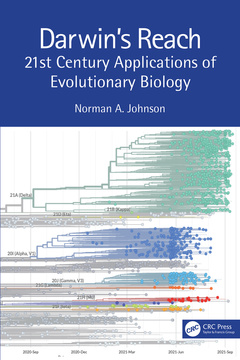Darwin's Reach 21st Century Applications of Evolutionary Biology
Auteur : Johnson Norman A.

The application of evolutionary biology addresses a wide range of practical problems in medicine, agriculture, the environment, and society. Such cutting-edge applications are emerging due to recent advances in DNA sequencing, new gene editing tools, and computational methods. This book is about applied evolution ? the application of the principles of and information about evolutionary biology to diverse practical matters. Although applied evolution has existed, unrecognized, for a very long time, today?s version has a much wider scope. Evolutionary medicine has formed into its own discipline. Evolutionary approaches have long been employed in agriculture and in conservation biology. But Darwin?s reach now extends beyond just these three fields. It now also includes forensic biology and the law. Ideas from evolutionary biology can be used to inform policy regarding foreign affairs and national security. Applied evolution is not only interdisciplinary, but also multidisciplinary. Consequently, this book is for experts in one field who are interested in expanding their evolutionary horizons. It is also for students, at the undergraduate and graduate levels. One of the public relations challenges faced by evolutionary biology is that most people do not see it being all that relevant to their daily lives. Even many who accept evolution do not grasp how far Darwin?s reach extends. This book will change that perception.
Key Features
- Emphasizes the expanding role evolutionary biology has in today?s world.
- Includes examples from medicine, law, agriculture, conservation, and even national security
- Summarizes new technologies and computational methods that originated as innovations based in part or whole on evolutionary theory.
- Current. Has extensive coverage of the COVID-19 pandemic and other recent topics.
- Documents the important role evolution plays in everyday life.
- Illustrates the broadly interdisciplinary nature of evolutionary theory.
Resources
The applications of evolutionary biology are far too numerous to include in just one book. Plus, new scientific findings emerge almost every day underscoring the central role evolution plays in our lives. The author has established a blog site to highlight these fascinating discoveries. Please visit https://darwinsreach.blog to be inspired by ?? endless forms most beautiful and most wonderful [that] have been, and are being evolved.? (the last line of Charles Darwin?s The Origin of Species).
Law. The Sequence on the stand - Uses of evolutionary genetics in court proceedings. Kings of the Lab: Evolution and forensic entomology. Health. Paging Doctor Darwin: An introduction to evolutionary medicine. The past isn’t through with us: evolutionary mismatch. Evolution and Infectious Disease. Darwin vs the Emperor of Maladies: how evolutionary medicine principles can be applied to cancer. Evolution and the stages of life. The future is personal – personalized genomics and medicine. Food. Evolution and breeding. Blessed Are The Cheesemakers. Pollination. Managing agriculture. So long, and thanks for all the fish: Evolution and fish management. Environment. Conservation Genetics. Evolutionary responses to a rapidly changing environment. Urban ecology: Cities as the new evolutionary frontier. Darwin Goes to the Dogs. Society. Darwinian security. Human diversity. Our future. Epilogue – The utter strangeness of the octopus: How evolutionary biology informs exobiology.
Norman Johnson is an evolutionary geneticist, who received his B. S. from William and Mary (1987) and a Ph.D. from the University of Rochester (1992). His doctoral thesis was on the genetics of hybrid sterility between different species of Drosophila. He was a postdoctoral fellow with Michael Wade on quantitative genetics of hybrid traits between species of Tribolium flour beetles at the University of Chicago. Johnson teaches classes in genetics and/or evolution. Most of his research has been on the genetics and evolution of why hybrids between species are often sterile or inviable. Other research interests include the evolution of sex chromosomes, the evolution of extremely large dietary niches in insects, and the interplay between the relaxation of selection and the loss of traits. He wrote Darwinian Detectives: Revealing the Natural History of Genes and Genomes, published in 2007. Johnson was the lead organizer for a working group at the National Evolutionary Synthesis Center (in Durham, NC) on Communicating the Relevance of Human Evolution. One of the outcomes was a paper for American Biology Teacher that addresses the question, “if humans evolved from chimps, why are there still chimps?” Johnson was the section editor for the Applied Evolution section of the Encyclopedia of Evolution . He wrote three of the entries (overview of evolutionary medicine and cancer, pest management, and evolution and breeding) and commissioned a dozen other entries in subjects ranging from evolution and climate change response to evolutionary computation to evolution and national security.
Date de parution : 12-2021
15.6x23.4 cm
Date de parution : 12-2021
15.6x23.4 cm
Mots-clés :
Urban Heat Island; evolutionary medicine; CRISPR Gene Edit; genetically modified organisms; Ancient DNA; DNA sequencing; Purple Sea Urchin; conservation genetics; HIV Evolution; personalized medicine; Vice Versa; Phage Therapy; Phage Cocktail; DNA Barcoding; BRCA1; Gulf Killifish; CRISPR; DNA Evidence; Phage Study; Honey Bees; DNA Fingerprinting; Gough Island; Ancient DNA Study; Bumble Bees; Sterile Male Technique; Gm Crop; Cheddar Man; CFTR Gene; DNA Information; UK Biobank



